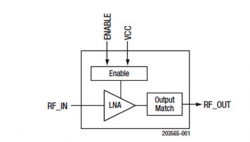RF Micro Devices (RFMD), which last year announced plans to exit the GPS solutions business in order to focus on core semiconductor component opportunities, hasn’t abandoned the GNSS marketplace completely.
RF Micro Devices (RFMD), which last year announced plans to exit the GPS solutions business in order to focus on core semiconductor component opportunities, hasn’t abandoned the GNSS marketplace completely.
On February 5 the Greensboro, North Carolina–based company launched its RF2815, a GPS low noise amplifier (LNA) module with integrated surface acoustic wave (SAW) filter designed for use in GPS receivers. The RF2815 measures 3.3 x 2.1 x 1.0 millimeters and complies with European Union (EU) requirements for restriction of the use of certain hazardous substances (ROHS).
RFMD is targeting the new module at manufacturers of battery-powered mobile devices, such as portable navigation devices (PNDs) and GPS-enabled CDMA handsets. According to the company, the cellular- and PCS-band rejection characteristics of the integrated SAW filter equip the RF2815 for non-concurrent and simultaneous GPS operation in CDMA-basded cell phones. The modulare reportedly has a typical noise figure 0.85 dB and a gain of 13.5 dB.
Paul Augustine, general manager of RFMD’s Component Solutions Business Unit said, "The majority of today’s CDMA handsets incorporate GPS functionality, and location-based services continue to gain in popularity in smart phones and in other mobile devices. The RF2815 is first in a line of innovative new products from RFMD that address this expanding market segment."
Samples and preproduction quantities of the RF2815 are available immediately, priced at $0.70 each in quantities of 10,000 units.
RFMD acquired its gallium arsenide-based GPS technology in 2001 from IBM Semiconductors. In 2006, the company introduced a software/host-based GPS solution, the RF8110, but then in May 2008 announced that the company was reducing its investments in wireless systems, including cellular transceivers and GPS solutions, and would exit those markets.





